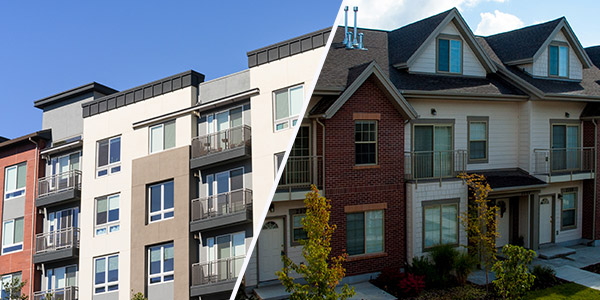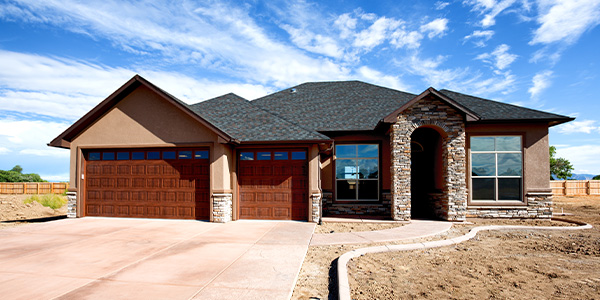Homebuyers
What is the Difference Between a Condo and a Townhouse?
May 21, 2024
Are condos and townhouses the same? It's a common question among many first-time buyers or homeowners looking to scale down to something a little cozier. It's easy to confuse the two based on appearance alone. However, condos and townhouses aren't the same. What is the difference between a condo and a townhouse exactly?
Broadly speaking, condos are individual units within a larger complex. They are more like "ownable" apartments. Meanwhile, townhouses are considered independent structures. Keep reading to learn more about how to tell the difference between a condo and a townhouse.
Definition of a Condo
Also known as a condominium, a condo is a single-unit residence that's housed within a larger building. While condo layouts vary widely around the country, the basic configuration is a building consisting of several units per floor. Like apartments, condos generally have neighbors above, below, and on both sides.
When you own a condo, you have exclusive ownership of your unit. Condos do not come with "yards" or property. While not mandatory, many condos do have gyms, pools, and clubhouses. It's important to spend time researching a condo buying guide to decide if the convenience and carefree nature of condo living is worth the smaller living space and restrictions of this choice.
Definition of a Townhouse
If a condo can be described as being closer to apartment-style living, a townhouse can be described as being closer to living in a single-family home. A standard townhouse typically stands two or three stories tall. While townhouses generally shares walls with neighbors on both sides, they don't have any units above or below them.
Key Differences Between Condos and Townhouses
Condo living is more communal compared to townhouse living. There are also differences regarding what you own versus what's shared.
Ownership and Maintenance Responsibilities
Condo owners own nothing beyond their walls. That means that all maintenance of the grounds surrounding a condo unit are handled by the condo association. Most townhouses come with small plots of land that enable owners to enjoy both front and back yards. These yards are owned and maintained by the townhouse owner. Additionally, most townhouses come with garages on the lower level.
While condo owners and townhouse owners are generally responsible for their own appliances, condos often have central air and heating systems that are maintained by the condo association. Meanwhile, many townhouses have firewalls between units with no shared ventilation. Since townhouse owners own their exterior walls, they are also generally responsible for siding, roofing, and other updates. Condos are all updated at the same time as part of a capital improvement.
Homeowners Association (HOA) Fees and Regulations
Both condos and townhouses typically have HOA fees that all residents must pay. In general, condo fees can be higher simply because 100% of building maintenance costs are funded by these fees. Typically totaling up to several hundred dollars per month, condo fees are used to cover:
- Capital updates
- Condo amenities
- Recycling and garbage collection
- Security
- Homeowners insurance for the property
- Parking
- Paving
- Snow removal
- Leaf removal
- Landscaping
In contrast, townhouse HOA fees only go toward maintaining community areas instead of being put toward updates or maintenance for townhouses. Townhouses fees that can range from under $100 to several hundred dollars per month are used to cover:
- Landscaping for shared spaces
- Repairs and maintenance for shared spaces
- Recycling and garbage collection
Condos tend to have stricter rules and regulations compared to townhouses. This comes down to the communal way that condo associations operate. Overall, condo residents need to follow rules regarding quiet hours, when trash can be placed outside, and exterior decorations. There are also more restrictions regarding interior structural changes and renovations. While townhouse HOA rules can be looser, residents still generally need to follow guidelines regarding exterior house changes, how they decorate their lawns, and what they park in their driveways.
Pros and Cons of Living in a Condo
When looking at the pros and cons of a condo, condos shine for people who want a convenient, efficient option that doesn't require constant DIY repairs or mowing. It can be like getting all of the perks of being a renter with the added benefit of property ownership. Many high-end condos also come with luxury amenities that cater to busy lifestyles, provide relaxation, and allow residents to socialize.
Of course, some people dislike the lack of privacy that comes with condo living. Having neighbors on all sides can be stressful for a person who struggles to sleep in noisy environments. Additionally, condos tend to have high HOA fees that can add significantly to the monthly cost of ownership.
Pros and Cons of Living in a Townhouse
Townhouses offer a midway point between condo living and full-fledged suburban living. Many people enjoy that townhouses are often built in walkable areas with access to public transportation. It can be like getting all of the perks of living in a single-family home without having to move to a neighborhood in the middle of suburbia. The added privacy and autonomy that go with townhouse living are also appreciated.
Of course, townhouse living comes with the drawback of being on the hook for HOA fees while still having to manage 100% of the upkeep and maintenance for your property. The restrictions on how you can change your townhouse's exterior can also be stifling for someone who wants a unique place to live.
Financial Considerations
Because they are often larger and more private, townhouses generally cost more than condos. This makes condos attractive to many first-time buyers. Condos also generally have lower property taxes than townhouses because you'll be paying taxes on a much smaller space. However, townhouses can be easier to purchase than condos. The reason why is that condo mortgages can be complex. When buying a condo, your lender looks at the fact that your finances as a borrower will be intertwined with the overall financial health of the condo association.
Deciding between a townhouse and a condo for your long-term financial goals is a personal decision. While choosing a condo may help you to get into homeownership sooner, condo resale value is often lower compared to townhouses and single-family homes.
Lifestyle Considerations
Like all home decisions, choosing between a condo and a townhouse comes down to what works for you based on your lifestyle and finances. A condo may be more ideal for a busy person who doesn't want to be bogged down by home and lawn maintenance. A condo is often a stepping stone for building equity until you're ready to jump into your first single-family home in a few years.
A townhouse may be a more attractive option if you're looking for something closer to a traditional home without taking care of a full-sized lawn or moving away from work or transportation options.
Market Trends and Resale Value
Prices for condos and townhouses tend to follow general pricing trends in the market. Townhouses are often lumped in with single-family houses when statistics on home sales are compiled. In March 2024, the market saw single-family month-over-month sales decrease 4.3%. Condominium sales were down 4.9% compared to the prior month. On a year-over-year basis, single-family home sales were down 2.8%. However, condo sales were down 11.4%. Pricing for both increased on a year-over-year basis from March 2023 to March 2024. While the prices of single-family homes rose 4.7% to reach $397,200 in March 2024, the median sale price of condominiums increased 5.8% to reach $337,900.
Demand can be higher for condos and townhouses in high-priced markets simply because their lower prices increase home affordability for some buyers. In markets where mid-priced and affordable housing is scarce, there is often a high demand for both condos and townhouses because they are the only entry-priced options for some buyers.
An FHA-approved condo can be one of the most affordable ways to get into homeownership. Resale value isn't always as predictable with attached units. Condos tend to lose resale value when overall prices go down because there is more low-priced competition out there on the market. A townhouse's resale value is heavily dependent on location because many people prefer townhouses in walkable and commute-friendly areas over single-family homes in neighborhoods located away from urban centers.
FAQs
What are the main differences between a condo and a townhouse?
Condos are generally apartment-style residences that come with fees that cover all maintenance and updates. Condo owners only own what's within their four walls. Meanwhile, a townhouse operates more like a single-family home that just happens to share a horizontal wall with a neighbor. While townhouse owners manage home and lawn upkeep for their properties, they also contribute fees for the maintenance of shared spaces.
Which is cheaper to maintain: a condo or a townhouse?
The answer depends on what the homeowners association fees look like for both options. However, condos are generally less expensive to maintain compared to townhouses. While condo owners never need to worry about exterior maintenance or landscaping, some condos fees can total several hundred dollars per month. Meanwhile, townhouse owners do need to pay for their upkeep, updates, and maintenance. Most townhouse owners also pay homeowner fees that go toward the upkeep of shared spaces.
Can I customize a townhouse more than a condo?
Yes, townhouse owners can generally update their townhouse interiors, exteriors, and lawns in ways that conform to the rules of their homeowner association. Condo owners generally cannot make any structural changes to their units.








 Smart Moves Start Here.
Smart Moves Start Here.